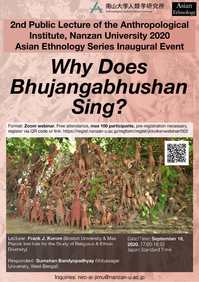研究活動 活動報告
第2回公開講演会 2nd Public Lecture of the Anthropological Institute 2020/Asian Ethnology Series Inaugural Event "Why Does Bhujangabhushan Sing?"【Video閲覧】Video Recording
2020年09月18日
 |
2nd Public Lecture of the Anthropological Institute 2020/Asian Ethnology Series Inaugural Event
"Why Does Bhujangabhushan Sing?"
Date and Time September 18, 2020 (Fri) 17:00~18:30
Format Zoom Webinar(Online)
Language English
Program
17:00-17:05 Introduction: Benjamin Dorman (Anthropological Institute)
17:05-17:45 Lecture: Frank Korom (Boston University/Max Planck Institute for the Study of Religious & Ethnic Diversity)
17:45-18:05 Respondent: Sumahan Bandyopadhyay (Vidyasagar University, West Bengal)
18:05-18:30 Q&A
Abstract
Bhujangabhusan Chakravarti was a Bengali Brahman from Birbhum District, West Bengal who used to sing a key pālā (episode) of a medieval text known as the Dharmamangal at the annual pūjā for the Bengali vernacular deity known as Dharmaraj. The performed text is only a small portion of the written text, which is over 1,000 pages in length, but runs close to one hundred pages in transcription, which moves back and forth from singing to spoken exegesis to explain to the audience what is going on and why. The performer cleverly and skillfully weaves together singing and speech to dazzle the audience with his erudition, but there is also a pedagogical and rhetorical dimension underlining his commentaries. My paper explores the contours of song and speech as a form of code shifting that allows for the accomplishment of different things: for the performer, it brings about a sense of ānanda (bliss) and for the audience a sense of jñān (knowledge). For the audience, the latter is important because the medieval text is not readily available, nor is it understood by the largely non-literate participants. Bhujangabhushan thus fulfills a dual role as an entertainer as well as a spiritual teacher, fusing the two through his use of easily comprehensible verse.
Report
Frank Korom's lecture focused on the Bengali Brahman Bhujangabhushan, whose performances of passages of relatively inaccessible medieval texts bring key elements of it to life for the audience. Through his entertaining performance, Bhujangabhushan connects the audience to spiritual concepts that are shared between them. 36 participants attended the lecture, which can be viewed below:
About the Asian Ethnology Series
The purpose of this series is to provide a forum for the research presentations of scholars who have either published work in Asian Ethnology, who are connected to the journal in some way, or whose work aligns with the interests and activities of the journal.
Although the journal currently publishes work in the categories below, the lecture series is not limited to the categories but is intended to be open to scholarly research in the areas of anthropology, folklore, and Asian Studies:
・narratives, performances, and other forms of cultural representation
・popular religious concepts
・vernacular approaches to health and healing
・local ecological/environmental knowledge
・collective memory and uses of the past
・cultural transformations in diaspora
・transnational flows
・material culture
・museology
・visual culture
The inaugural lecture in this series is by Frank J. Korom (Boston University/Max Planck Institute for the Study of Religious and Ethnic Diversity). Professor Korom is also the co-editor of Asian Ethnology.